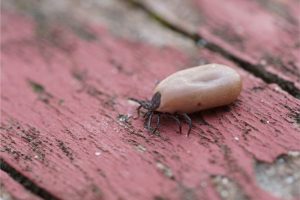Tick Season is Here—Are You Ready?
Tick Season is Here—Are You Ready?

The snow is finally melting, and the bounty of spring is beginning to arrive. Of course, along with the fresh breezes, colourful flowers, and singing birds come the parasites we all love to hate. Tick season has officially arrived, and protecting your pet—and your family—from the many diseases they carry is a top priority. Fortunately, the team at Parkside Animal Hospital is here to help!
Ticks 101
Ticks are commonly thought of as insects or bugs, but they’re actually arachnids (relatives of spiders and scorpions). They feed on the blood of animals and humans and are capable of transmitting a variety of diseases, including:
- Lyme disease
- Rocky Mountain spotted fever
- Ehrlichiosis
- Powassan virus
- Anaplasmosis
- Babesiosis
- Tick-borne encephalitis
- Tick paralysis
Ticks can’t fly or jump. Instead, they usually hang out on the tips of grasses and shrubs, waiting for a host to walk by so they can hop a ride. If you or a pet unwittingly bring a tick indoors, it can be transferred to other pets or people in the home. Although ticks can be found almost anywhere, they exist in larger numbers in wooded or grassy areas, along lakeshores and river beds, and anywhere deer are present.
Prevent, Prevent, Prevent
Preventing exposure to tick-borne disease is always preferable to treating your pet once they’re infected. In addition to keeping your pet on a flea and tick preventive, you can reduce your pet’s chances of coming into contact with these parasites with the following tips:
- Inspect your pet for ticks each time they come indoors. Ticks can attach anywhere on the body, especially around the ears, neck, head, feet, and base of the tail. If you find a tick, remove it by grasping the part closest to your pet’s skin with tweezers and pulling straight out. Dispose of the tick by drowning it in rubbing alcohol.
- Make your property less hospitable to ticks by keeping it trimmed and weeded. Remove piles of leaves, wood, and other debris.
- Wildlife often harbor ticks. Use fencing to keep them out of your yard, and never let your pet investigate wild animals (dead or living).
Tick Season in Ontario
Tick season in Ontario generally begins in April, although some years, ticks have been active as early as March. There’s a slight lull in tick activity over the summer, and it picks up again from September to November.
As a general rule, the hard freeze of the winter kills off these parasites in our neck of the woods, but if you and your pet are traveling south for the winter, please chat with us about whether a parasite preventive may be needed for your destination during these months.
If you want to start your pet on a parasite prevention protocol or you need a refill, please don’t hesitate to contact the staff at Parkside Animal Hospital.
